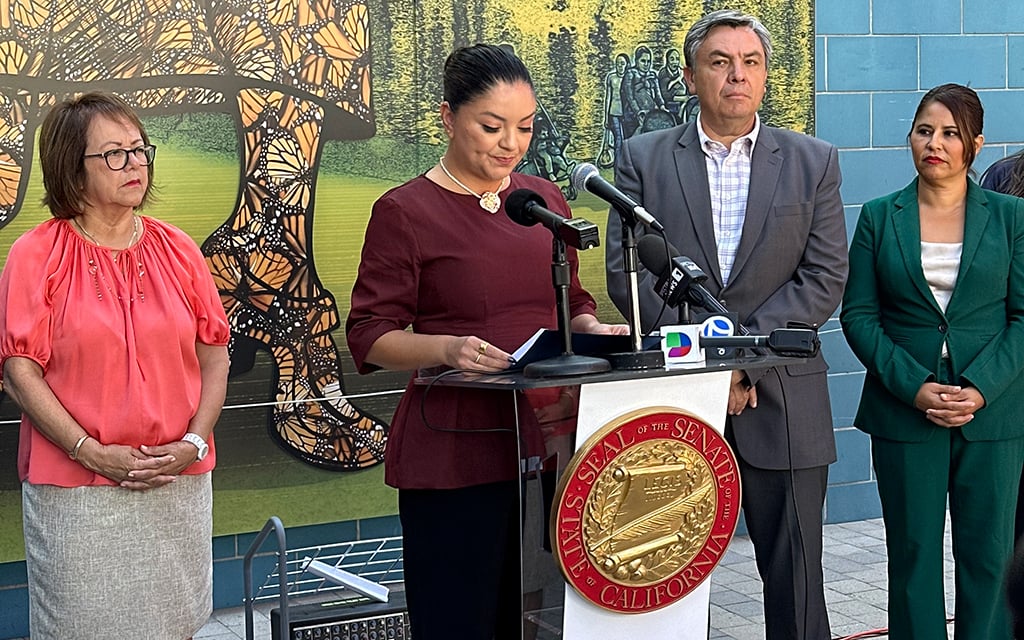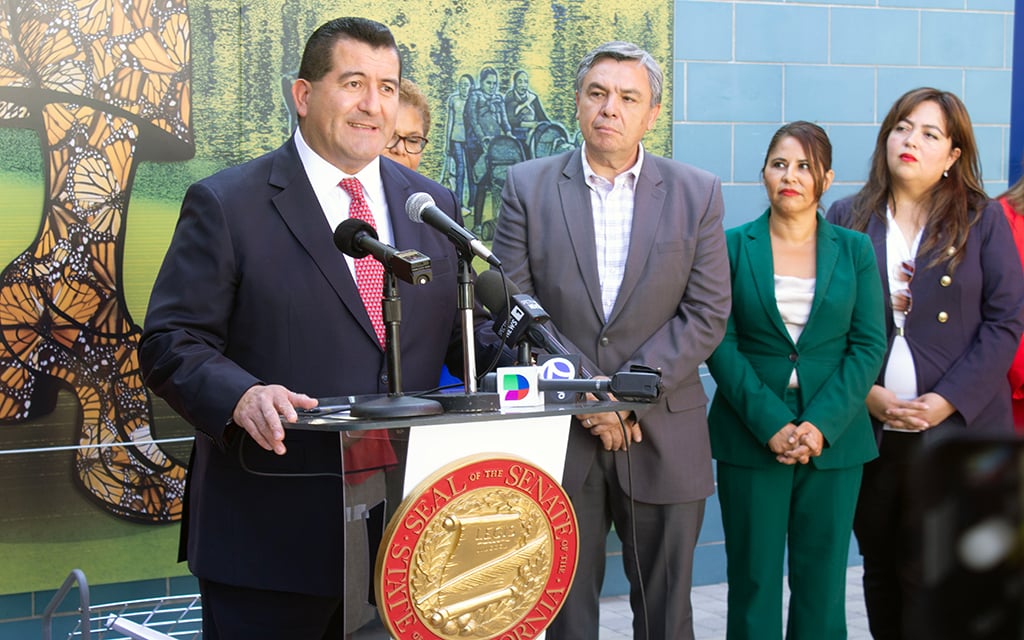
Cronkite News: Remember history: California launches Mexican Repatriation Memorial Project to honor residents deported during Great Depression
LOS ANGELES — On Thursday, Sens. Lena Gonzalez (D-Long Beach) and Josh Becker (D-Menlo Park) officially launched the Mexican Repatriation Memorial Project in Los Angeles.
The project aims to commemorate the 2 million Mexican Americans and Mexican immigrants who were forcibly deported from the United States during the Great Depression, including approximately 400,000 individuals from California. Senate Bill 537, authored by Gonzalez and Becker, was signed by Gov. Gavin Newsom in September. It will enable a selected nonprofit to construct and maintain a memorial in a public area of Los Angeles. The memorial is planned for completion before World Cup 2026 and the 2028 Summer Olympics, both held in LA.
President Herbert Hoover’s administration executed the deportations under the guise of creating jobs for “real Americans” during the economic crisis.
Elected officials, community members and descendants of those deported gathered at LA Plaza de Culturas y Artes in the historic El Pueblo neighborhood – recognized as the birthplace of Los Angeles and deeply tied to the Mexican American community – to memorialize this overlooked chapter in California’s history.
Gonzalez highlighted the bill’s significance in countering the negative rhetoric against Mexicans and Mexican Americans that has persisted over the decades and has recently been inflamed.

“The tragedies of this act were immoral, indefensible and outright wrong. This is American history, and it needs to be showcased to every child in California,” said California Sen. Lena Gonzalez of the Mexican repatriation during the Great Depression. Photo taken in Los Angeles on Oct. 24, 2024. (Photo by Brandelyn Clark/Cronkite News)
“Latinos are the backbone of our state and country. We know this, and our hard work, our diversity and our culture should be valued as such,” Gonzalez said.
Speakers at the event said confronting and remembering historical injustices is important in recognizing the Latino community’s fundamental contribution to society.
“This actually happened in the past. It could happen again, and we’re here to make sure it doesn’t happen again,” Becker said. “The solution to racism, it’s compassion, it’s education, and it’s action.”
SB 537 was inspired by the research project of then-high school student Tamara Gisiger. As a Mexican American, she was frustrated by the lack of representation in her history class and decided to take action. Gisiger was absent from the event but was represented by her mother, Claudia Romo Edelman, a Mexican immigrant.
“It’s in the young kids that actually are finding their identity, that don’t want to be put down, that want to know that Latinos are positive contributors to the country. Understanding the data … (and) having leaders like you that are going to bring history is what gives me hope,” Romo Edelman said of Gonzalez and Becker. “This country is … where everyone can shine … (and) contribute.”
Martin Cabrera Jr.’s grandfather, Emilio Cabrera, was among those deported. Cabrera is the CEO of the country’s largest Latino-owned investment bank, Cabrera Capital Markets. He said his grandfather instilled in him firm values of service and resilience, which he credits to his success.

Martin Cabrera Jr., CEO of Cabrera Capital Markets, reflects on the resilience of those affected by the repatriation efforts during the Great Depression. Photo taken in Los Angeles on Oct. 24, 2024. (Photo by Brandelyn Clark/Cronkite News)
“I would not be here without my grandfather outside of LA. When he was 12, he was taken, from our records, to Union Station and put in a boxcar and shipped to Mexico. … It was a land he didn’t know,” Cabrera said. “When he would tell me about his stories and being here in California, being shipped out, he just thought it was a part of life. You put your head down and you work hard and you get through it.”
Cabrera expressed his appreciation of the project, saying that although the deportations were repatriation injustice, recognizing Latino contributions to American history is paramount.
“This bill is extremely important because it not just shows the state of California, it shows the rest of the country who we are and what we’ve done to build this country. … Now we can look forward to make sure it doesn’t happen again,” Cabrera said.
Many speakers at the event, including Los Angeles Mayor Karen Bass, addressed a political issue looming over Mexican Americans today. The anxiety centered on former President Donald Trump’s promises of mass deportations, framed as a means to create more jobs and security in the United States.
He has pledged mass deportations of undocumented immigrants and efforts to secure the border, which has instilled fear and uncertainty in families within the Mexican American community.
“There is no way I can stand here with the irony of commemorating an injustice like a mass deportation when there is someone who is attempting to lead our country again with that being a major part of his platform,” Bass said.
The project aims to honor those who suffered during the deportations while educating future generations about the significance of remembering injustice.
“We must have a call to action. We must move forward in unity and understanding and always keep justice in the light amidst the darkest moments,” Gonzalez said.
Read the article on Cronkite News, here.
